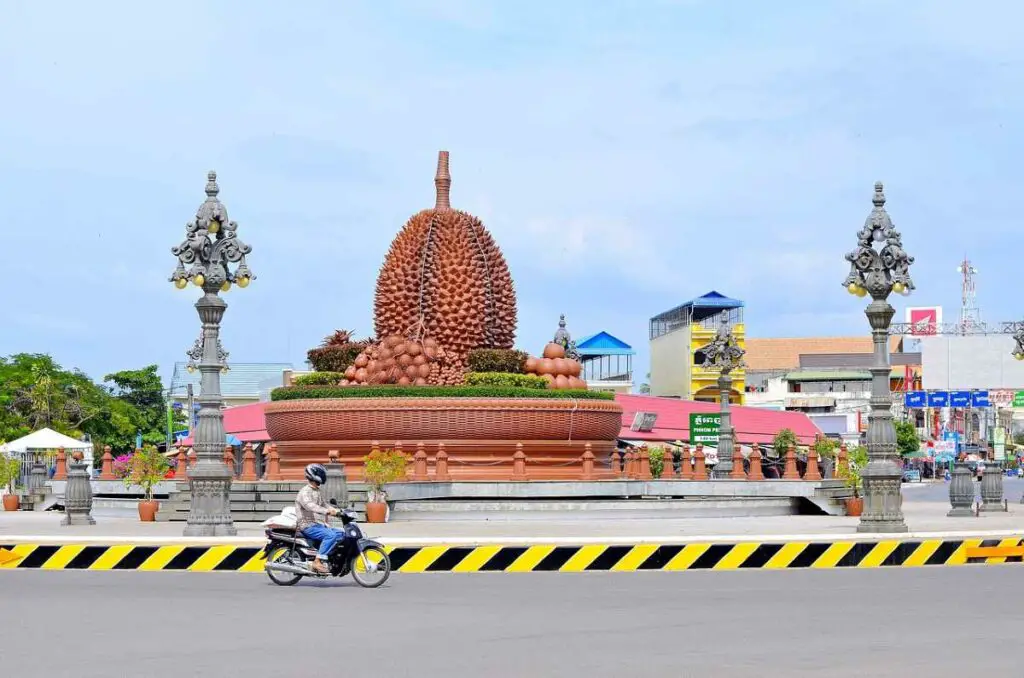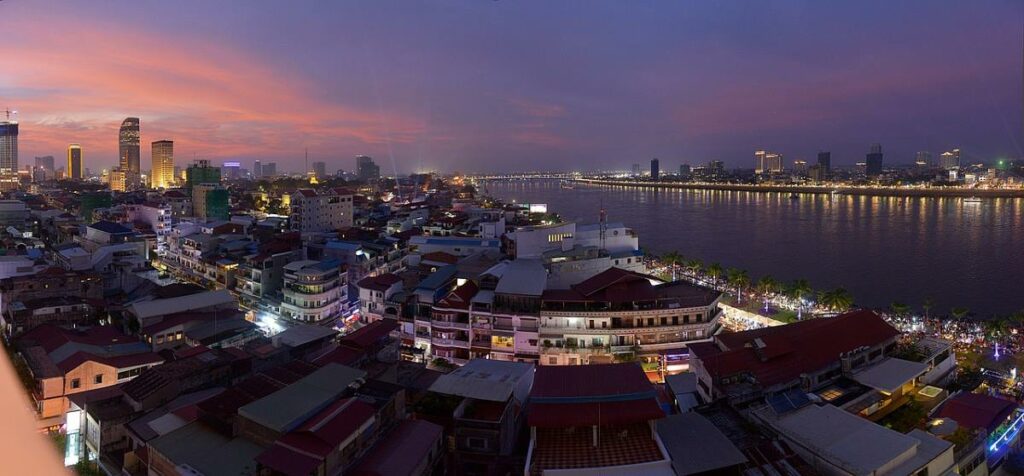
Cambodia's beauty is captivating, but it's important to stay vigilant against common travel scams. In this guide, we uncover the common scams in Cambodia as well as provide essential Cambodia travel info, and Cambodia tourist sites.
- Common Scams In Cambodia:
- Check this video for more Info on Common Scams In Cambodia:
- Cambodia Tourist Sites
- Cambodia Travel Info:
- FAQs On Common Scams In Cambodia And Cambodia Tourist Sites as well as Cambodia Travel Info
- Conclusion About Common Scams In Cambodia And Cambodia Tourist Sites As Well As Cambodia Travel Info
Common Scams In Cambodia:
Here are the list of Common Scams In Cambodia:
Charity And Donation Scam:
If someone approaches you claiming to collect funds for charities or orphanages, then avoid them. Some may use emotional stories to manipulate donations for personal gain. If you wish to support local causes, research reputable organizations and donate directly to them.
Beware of scammers posing as monks or nuns asking for donations. Remember that legitimate Buddhist monks never seek donations in this way. Ignore such requests and report them to the authorities.
Coin Collectors' Scam:
A local, dressed smartly, may approach you, claiming to be a coin collector interested in foreign currencies. They'll offer to buy your foreign money with Cambodian riels at a seemingly favorable rate, insisting there are no fees involved. However, the rate they offer is usually much lower than the official exchange rate, hoping you're unaware of the value of riels.
Decline politely and opt for official currency exchanges if you need Cambodian money, as converting riels back to your home currency can be challenging later on.
The "Take Me Home" Scam:
Often targeting men, this scam doesn't always involve prostitutes. It typically starts with a man meeting a seemingly friendly local woman at a bar who shows interest in him. However, when he takes her home, he's drugged and robbed of his belongings.
Another variation of this scam involves a woman spending time with a tourist, appearing sweet and attractive, only to later accuse him of rape in front of a group of men. To resolve the situation, the tourist is pressured to pay a hefty sum to avoid legal trouble. To avoid such situations, it's best not to bring strangers back to your hotel room and completely avoiding them.
Overbooked Or Closed Hotel Scam:
Some taxi drivers may try to trick you. They might say your hotel is closed or full and take you to a more expensive one where they get commission. Before you travel, call your hotel to check if it's open. Ask if they have a shuttle and arrange a pickup. If the taxi driver insists your hotel is closed, ask them to take you there anyway, saying you have a reservation.
Pickpocketing and Bag Snatching:
In busy tourist places, watch out for pickpockets and bag snatchers. Sneaky people may try to take your wallet or valuables from your pockets or bags without you noticing. They might also try to distract you by dropping something or bumping into you.
To stay safe, be smart with how you secure your bags and stay alert in crowds. Also, avoid showing off expensive things and ignore distractions, as well as keep your valuables in different places. Travel with only what you need.
Accommodation/Hotel Scams:
Be cautious of false advertising when booking accommodations/hotels. Some places may appear charming in ads but disappoint in reality. To prevent this, thoroughly research and read reviews. Also beware of fake listings or upfront payment requests for non-existent properties or accommodations. Work with reputable agents and verify ownership documents.
Some accommodation providers may falsely claim to be affiliated with reputable hotels or resorts, offering discounted rates. However, they may provide subpar accommodations or disappear after payment. Book accommodations through trusted websites or directly with established hotels. Verify the legitimacy of any accommodation provider before making payments.
Some accommodation providers may attempt to charge additional fees for your stay, particularly when traveling in a group. They charge hidden fees that are not clearly disclosed during booking, increasing the overall cost of a stay. Clarify the pricing structure before making any payment to avoid unwelcome surprises.
Currency Exchange Scam:
Be careful when changing money. Some places may cheat you by giving bad rates, fake money, or tricking you. Use trusted places like banks or official exchange offices to exchange money. They are safe and fair.
Street Money Changer Scam:
Be careful with street money changers. They might give fake money or cheat you with tricky math. It's better to exchange money at banks or official places. Always check rates and count your money to stay safe.
Food and Drinks with Added Substances Scam:
Sometimes, tourists have faced situations where their food or drinks were spiked due to which they have faced theft and other problems. So, to stay safe, always be careful about what you eat and drink. Moreover, it's best to avoid anything given by unknown people.
Fake Tour Agencies:
Be careful of fake tourist agencies offering super cheap deals. They might promise great trips, but you could end up disappointed and spending more than you planned. Before booking, do some research to make sure the agency is real and trustworthy.
Unofficial Tourist Information:
Watch out for fake tourist info places. They might give wrong info to get you to pay too much or go to certain shops. Stick to real info centers or trusted websites instead.
Unofficial Tourist Police:
In this scam, someone pretends to be a tourist cop and offers to help you, but they might ask for money. Always ask for ID from anyone saying they're a tourist cop. If you're not sure, find and ask the real tourist cops or local police for help.
Fake Guides Scam:
When you visit historical places, be careful of guides who aren't official. They might take you to shops where they get paid if you buy something. They could trick you into buying things you don't want. Some might even offer tours without required permission. They could also ask for a lot of money, saying they can show you special places or that some spots are closed.
To stay safe, only go with guides from trusted places. If someone comes up to you on the street, just say no thanks and find a real guide.
Fake Police Officers:
Watch out for scammers in police dress who say your ID is fake and want money. They may also steal your stuff while checking your ID and stuffs. So, if they approach, ask to show their ID, tell them you want to go to a real police station, or call your embassy.
Gem and Jewelry Scam:
Be careful at jewelry stores that seem too good, they might sell fake gems at high prices. Some pretend to be dealers offering rare gems cheaply, but they're often fake. So, buy from trusted stores and research before buying.
Street Vendor Manipulation:
When shopping in markets, some vendors may use pushy or manipulative tactics to pressure you into buying or inflate prices. Stay polite but firm, and feel free to walk away if you're not comfortable with such offers.
Street Drug Dealers Scam:
Beware of street drug dealers offering cheap and exotic substances in tourist destinations. These dealers, found in popular areas, may sell low-quality or dangerous drugs, leading to health risks and legal issues. To stay safe, choose licensed establishments and know the regulations, Meanwhile, prioritize safety and avoid deals from street dealers.
Sim Card Scam:
Buying a local SIM card can be essential for staying connected, but some sellers may overcharge or provide SIM cards that don't work properly or have limited or no data. Thus, purchase your SIM card from official retail outlets or established mobile network shops.
ATM Scams:
Strangers may offer help at ATMs, intending to skim your card and steal your PIN. Be cautious while using ATMs. Scammers may place skimming devices to steal your card information. Decline assistance and use your hand to shield the number pad while entering your PIN. Also, opt for ATMs in well-lit, secure locations and avoid quiet area's ATMs.
The "Closed" Scam
This scam involves a friendly local telling you that the attraction you want to visit is closed for various reasons like a religious ceremony or holiday or for a lunch. They then guide you to a different place, like a shop of a attraction, where they pressure you to buy something expensive or pay a lot for entry.
To avoid falling for this trick, go and check the main entrance or ticket counter yourself. It's even better to check the opening hours before you go online, so you know what to expect. This information is usually available online.
Bird Poop Scam:
Be wary of a scam where a scammer throws a white substance on your shoulder to distract you. While someone offers to help clean it off, they may pickpocket you. Politely decline assistance from strangers and keep your belongings secure.
Credit Card Swap Scam:
Protect yourself from credit card scams at restaurants by keeping your card within sight. In restaurants or shops, dishonest employees may use portable card skimmers to clone your credit card information for fraudulent purposes. Thus, always check that the returned card is yours before leaving to ensure it hasn't been switched with an expired one.
Also be careful as the double charge card scam could occur. Some servers might charge your credit card twice for the same order. To protect yourself, consider paying in cash or, if using a card, accompany the server to the payment terminal to ensure a single and accurate transaction.
Taxi Scam:
Be careful with some taxis. They might pretend to be luxury cars, mess with the meter to charge you extra, or they may say the meter is broken to make you pay more, even hundreds of dollars. They might take longer routes and say they're shortcuts. Also, watch out if they don't give you enough change, saying they don't have smaller bills.
So, ask the driver to turn on the meter and plan your route before getting in. Carry small bills and coins to avoid scams. Use licensed taxis or trusted ride-sharing apps, and always ask for a receipt.
Be careful of some taxis near airports or train stations. Stay away from unofficial taxi lines and only use the official ones. Make sure the meter is working to avoid paying too much.
A driver covering their mouth and nose with a towel might use this as a means to disorient passengers. They could spray a substance with a strong odor that, when inhaled, can lead to dizziness or loss of consciousness. In such a vulnerable state, passengers become easy targets for robbery, assault, or abandonment. So, opt for reputable transportation services or official taxis with identifiable markings. Also, if you notice any unusual smells or feelings, get out of that cab in busy area. Immediately address the driver or seek help if necessary.
Motorbike Rentals Scam:
Be careful when renting a motorbike for exploration, as some rental shops may not be trustworthy. They might give you poorly maintained or stolen bikes and then charge a lot for small damages. To avoid this, choose well-reviewed rental shops, take pictures of the bike's condition, and make sure the rental agreement is clear. Don't give them your passport, even if they ask to hold it.
Tuk-Tuk Scam:
Locals appear friendly and persuade tourists to hop into their colorful three-wheeled vehicles, named Tuk-Tuk. While some tuk-tuk rides are genuinely enjoyable and reasonably priced, others deceive travelers by taking them to expensive shops or attractions, all to earn commissions. Tuk-Tuk drivers may ask for toll payments, sometimes without proper authorization.
To avoid falling victim to this scam, clearly state your destination and firmly decline any unplanned stops. It's important to agree on the fare upfront and ensure the driver uses the meter. Furthermore, be cautious if a driver offers surprisingly low prices or insists on taking you to specific places. Also, check the legitimacy of toll charges and negotiate when necessary.
Baby Milk Beggars Scam:
You may encounter a young woman with a baby outside a store, asking for help to buy milk formula. While it seems like a compassionate gesture to buy it for her, she may actually sell it back to the shop for cash once you're out of sight.
Although it may be difficult, it's best to politely refuse and consider donating to reputable NGOs in Cambodia that assist mothers and infants in genuine need.
Check this video for more Info on Common Scams In Cambodia:
You can find more details on previous mentioned tourist scams on this video.
If you prefer not to watch the video, you can read the article instead: de-reviews.com/common-travel-scams-avoid-tips-and-guidance/
It provides detailed explanations of previously mentioned tourism scams, including information on common travel scams in many countries.

Cambodia Tourist Sites
Now you know about the Common Scams In Cambodia. But, that doesn’t mean you should avoid to visit Cambodia. Keeping in mind about the possible tourism scams as mentioned earlier, you can enjoy your travel exploring these Cambodia Tourist Sites:
- Angkor Wat.
- Tuol Sleng Genocide Museum.
- Ta Prohm.
- Kampot.
- Angkor Thom.
- APOPO Visitor Center.
- Choeung Ek Genocidal Center.
- Angkor National Museum.
- Cambodia Landmine Museum.
- Sothy's Pepper Farm.
- Virachey National Park.
- Bokor Hill Station.
- Banteay Srei.
- Siem Reap.
- Krong Ta Khmau.
- Preah Khan.
- Bayon Temple.
- Angkor Archaeological Park.
- Daughters of Cambodia Visitor Centre.
- Baphuon Temple.
- Mekong River.
- Beng Mealea.
- Made in Cambodia Market.
- Banteay Srey Butterfly Centre.
- Yeak Laom Volcanic Lake.
- Ream National Park.
- Koh Rong
- Koh Ker Temple.
- Battambang Bat Caves.
- La Plantation.
- Pre Rup.
- Preah Vihear Temple.
- Bamboo Island
- Banlung
- Poipet, and many more.
Cambodia Travel Info:
Here are few more Cambodia Travel Info to avoid possible Common Scams In Cambodia:
1. Get a Local SIM Card:
Start your trip by getting a local SIM card. It'll help you use your phone for maps, checking info, and calling for help if you need it. Make sure to download useful apps like maps, ride-sharing, and translation tools before you go.
2. Plan Ahead:
Before you go on your trip, find out about places to visit, how to get around, local rules, and things to watch out for. Make a plan with maps, directions, and contacts for where you're staying and who to call if you need help. Having a good plan helps you avoid scams.
3. Verify Info:
Don't trust info from people you don't know, especially if they approach you first. Instead, use guides, official sources, or ask your embassy for accurate details about places, events, and local stuff.
4. Learn the Local Rules:
Know the rules of the place you're visiting so you understand what you can and can't do. This helps you avoid getting tricked by scammers who might try to use your lack of knowledge against you.
5. Learn Basic Local Language:
Knowing a few easy local words can keep you safe from common travel scams. For example: Saying "hello" and "thank you" in local language can help you connect with locals and signal that you're not an easy target for scams.
6. Stay Confident:
Scammers look for tourists who seem unsure. Act confident, even if you're not sure where you are. Also, say "no thanks" firmly to offers or invitations from strangers you don't trust.
7. Use Trusted Transportation Apps:
When you need a ride, go for popular ride-sharing apps. Because, they show you how much your trip will cost and tell you about your driver.
8. Keep Valuables Secure:
Get a special bag or pouch that's hard for thieves to steal from. Also, keep important things like your passport and travel insurance in a safe place.
9. Blend In with the Locals:
Wear simple clothes, following the local customs and avoid showing off valuables. This helps you blend in with locals and not attract unwanted attention. But still, be careful who you trust, as not everyone is friendly.
10. Be Sure Before Drinking or Smoking:
Before drinking or smoking in public places, make sure it's allowed. Because, some places may have strict rules, and breaking them could get you in trouble. Also, avoid buying from street sellers, as their products might be low quality and cause problems. If unsure, ask locals or other travelers for advice.
11. Secure Your Place to Stay:
When booking a hotel, use trusted websites or the hotel's official site. Check your booking info carefully and keep a copy of your reservation. This helps avoid any issues when you get there.
12. Avoid Promotional Illusions:
Be careful on social media. Some offers for free stuff might ask you to share or comment to enter. But watch out! Some of these are tricks to get more likes and followers. Always double-check these offers and make sure they're genuine before you join in.
13. Maintain a Low Profile:
While traveling, avoid drawing attention to yourself. Use simple bags and only carry what you really need. Keeping a low profile can help you avoid getting noticed by scammers.
14. Use Trusted Services:
When booking tours, transportation, or services, opt for well-established and reviewed providers. Read online reviews, consult guidebooks, and ask fellow travelers for recommendations.
15. Use Trusted Currency Exchange:
Only exchange your money at banks or official currency exchange places. Avoid using ATMs that aren't from major banks. Because, they might charge you high fees, or they be the fake or skimming ones.
16. Be Wary of Tempting Offers:
Don't easily trust things like super cheap prices, attractive women, friendly strangers, or too-good-to-be-true deals. Take a moment to think before saying yes, as these could be scams to trick you. Always double-check if something seems fishy before agreeing to it.
17. Check the Source:
When you see a cool deal online, make sure it's from a genuine place. So, look for contact info and see if they seem real. Genuine places give clear details. If it seems too amazing, then search for more info to make sure it's not a trick.
18. Share Your Itinerary:
Make sure a close friend or family member knows your travel plans. That way, someone knows where you are in case you need help.
19. Negotiate Wisely:
Negotiate prices respectfully while shopping at local markets and shops. If you feel pressured, don't hesitate to walk away.
20. Stay Updated:
To avoid troubles, it's good to learn about local scams and hear from other travelers. Ask for tips and suggestions from people who have been there before.
21. Trust Your Instincts:
If something feels suspicious, then trust your instincts and consider other options.
22. Report Suspected Scams:
If you think something fishy is going on or you're not sure, then tell the local police or your embassy. This helps keep others safe and stops the scammers.

FAQs On Common Scams In Cambodia And Cambodia Tourist Sites as well as Cambodia Travel Info
How can I distinguish between official and unofficial tour guides to avoid Common Scams In Cambodia?
Choose guides recommended by tourist offices or well-known companies. Likewise, avoid taking tours from random people you meet on the street. Also, it's safer to book your tours ahead of time through trusted sources.
How can I identify genuine tour guides at Cambodia Tourist Sites to avoid Common Scams In Cambodia?
Genuine tour guides often work for well-known companies. So, don't accept offers from strangers near tourist spots. Instead, book tours in advance with trusted sources and check if your guide is qualified.
Are street sellers near Cambodia Tourist Sites reliable for purchasing souvenirs?
Watch out for street sellers who might sell fake or expensive souvenirs. Also, go to known stores for souvenirs, check prices in advance, and be careful with offers that seem too good to be real to stay safe from scams.
What precautions should I take when using public transportation to visit Cambodia Tourist Sites?
Be careful in busy transportation areas, use anti-theft items, and keep your valuables safe. Also, watch out for distractions and be cautious if someone you didn't ask for help offers assistance, especially in crowded tourist places.
How can I protect myself from Common Scams In Cambodia to explore Cambodia Tourist Sites?
Follow the Cambodia Travel Info i.e. before visiting popular attractions, research them in advance. Purchase tickets through official services and be wary of unauthorized sellers offering discounts. Meanwhile, rely on reputable information centers or trusted online platforms for accurate information.
What are some Cambodia Travel Info to avoid Common Scams In Cambodia while exploring Cambodia Tourist Sites?
Stay informed about common scams, be cautious of unsolicited offers, and rely on official channels for information and bookings. Likewise, use secure accessories for valuables, trust accredited guides, and report any suspicious activities to local authorities.
Conclusion About Common Scams In Cambodia And Cambodia Tourist Sites As Well As Cambodia Travel Info
Now you know about the Common Scams In Cambodia And Cambodia Tourist Sites as well as Cambodia Travel Info. So, if you want to say anything related to this post, then please feel free to place your comments below.
Share Your Experiences On Common Scams In Cambodia And Cambodia Tourist Sites and Cambodia Travel Info:
If you've come across more "Common Scams In Cambodia" or have fascinating travel stories to share "Cambodia Travel Info", we'd love to hear from you. Feel free to leave a comment below, as your input can help others learn from your valuable experiences and insights.
Spread Awareness On Common Scams In Cambodia And Cambodia Tourist Sites and Cambodia Travel Info:
Please feel free to share this information with your friends and families through your social media accounts to let them know about the possible scams they can encounter while traveling in Cambodia.
Join the Conversation
If you possess any valuable information about tourism scams, regardless of their location in the world, please don't hesitate to get in touch with us via email at ad***@********ws.com. Your input can truly make a significant difference in ensuring the safety of travelers globally.
Additional Info On Common Scams In Cambodia And Cambodia Tourist Sites and Cambodia Travel Info:
Below you can find additional info such as references and other related articles:
References
Travel wisely and savor all the delights that the Cambodia has in store for you!


Leave a Reply